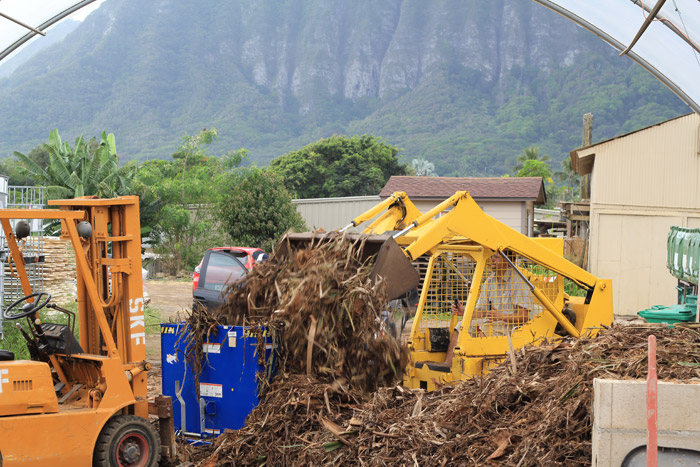Small Kine Farm sells its organic mushroom compost (also known as spent mushroom substrate or SMS) to farmers, gardeners and other agricultural companies. This nutrient-rich by-product of mushroom farming is widely used on the U.S. Mainland for gardening, vegetable production and weed control. The information below comes from a great resource on mushroom compost: www.mushroomcompost.org.
What is mushroom compost?
Mushrooms are grown in a rich growth media, which on the U.S. Mainland is a mixture of agricultural materials, such as straw, hay, poultry litter, peat moss, and other natural organic substances. In Hawai‘i, this growth media contains nutrient-rich green waste materials unique to our island environment.
How does compost improve the soil?
Overall, compost can be very beneficial to the soil, and mushroom compost is no exception. A good, organic compost, if used properly, can improve plant growth in poor or marginal soils because compost amended into those soils will improve the structure of clay soils, reduce surface crusting and compaction, improve drainage, increase beneficial soil microbial activity, and reduce the need for fertilizer.
What beneficial properties are found in mushroom compost?
The visual appearance of a good quality, thoroughly processed mushroom compost resembles a dark topsoil. It has a loose crumbly structure and an “earthy” aroma. Recent research conducted at the Pennsylvania State University showed that mushroom compost contains an average of 25 percent organic matter and 58 percent moisture on a wet volume basis. Where uniform application and good mixing with soil is required, this amount of organic matter and moisture in mushroom compost is ideal for making surface applications or incorporating into the soil. Mushroom compost contains an average of 1.12 percent nitrogen in a mostly organic form that slowly is available to plants. Also, mushroom compost contains an average of 0.67 percent phosphate (phosphorous) and 1.24 percent potash (potassium), as well as other plant nutrients such as calcium (2.29 percent) magnesium (0.35 percent) and iron (1.07 percent). The average pH of mushroom compost is 6.6 (6.0 to 7.0 is an ideal range for most plants). The amount of carbon relative to nitrogen is an important indicator of nitrogen availability for plant growth, and an ideal compost should have a ratio of 30:1 or lower. Mushroom compost has an excellent 13:1 ratio, indicating outstanding nutrient availability and mature and stable organic compost.
How much mushroom compost should be used for establishing roadside vegetation?
The best approach would be to apply mushroom compost uniformly and evenly at a one to three inch thickness (three to nine cubic yards per 1,000 square feet) on the surface of the intended site, and then incorporate into the existing soil below. Next, seed or transplant the desired vegetation. For example, with turfgrass, sow the grass seed uniformly at a rate recommended for the turfgrass species used, and water thoroughly. For sites with steep slopes, erosion blankets or netting may be helpful to reduce further the possibility of soil erosion.
What about salts?
Excessive amounts of soluble salts (for example, calcium, magnesium, potassium and others) in the soil can cause injury to turfgrasses and other groundcover-type plants. However, research at Penn State shows that quality mushroom compost does not contain soluble salt concentrations high enough to impede turfgrass seed germination or cause damage to an existing turf stand. Also, when mushroom compost is tilled or incorporated into the soil, the salt concentration is diluted, and irrigation or natural rainfall will further reduce salt concentrations by leaching those salts from the root zone. Ask your mushroom compost supplier to provide you with a detailed laboratory analysis to ensure you’re getting good quality and a reliable compost product.
What about weeds?
Prior to removing the compost from a mushroom production house, the entire inside of the house is pasteurized to eliminate any pests, pathogens or weed seeds.
Contact us: By email to: smallkinefarm(at)gmail.com or phone us at (eight zero eight) Two Six Two – Two Seven Two Four.


